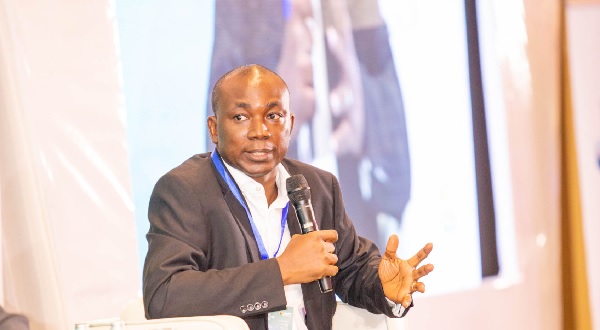
GH¢1 trillion GDP forecast: Let’s talk inclusive growth — Bokpin
Economist and professor of finance at the University of Ghana, Professor Godfred Bokpin, says while a GH¢1 trillion economy is a significant milestone, it would, however, be irrelevant if such growth forecast does not inure to the benefit of the ordinary Ghanaian.
“We all celebrate significant milestones in our lives, and so a GH¢1 trillion cedi economy would be a significant milestone. However if such growth is not inclusive and broad-based, it would be meaningless,” he said.
He said this will ensure that the expected milestone in economic expansion is reflected in the pockets of the ordinary citizens through higher incomes.
Ghana's economy is projected to be valued at over GH¢1 trillion in 2024 from the GH¢610 billion recorded in 2022.
It would be the first time in the country’s economic history to cross the GH¢1 trillion Gross Domestic Product (GDP) mark.
Mr Ofori-Atta who announced this when he presented the 2024 budget statement to Parliament said “with such a milestone ahead of us, the government is protecting, at all costs, the foundation for sustained economic expansion; a foundation that has been achieved through the sweat and patience of the Ghanaian people."
We pledge to protect this for all our people and especially for private sector growth. And we shall do so by ensuring that the enabling factors are in place and accessible to all. These will include reliable energy supply, stable Cedi, lower inflation and lower interest rate regimes, access to private sector credit, infrastructure provision, food security, national security, and inter-continental market linkages through increasingly active platforms such as the AfCFTA.”
Sharing his views on the 2024 Budget Statement presented to Parliament on Graphic Business’ Twitter (X) Spaces Dialogue Series yesterday, Prof. Bokpin said the government must engineer inclusive growth to ensure that the projected growth in GDP benefits all segments of society, particularly low and moderate income earners.
This approach, he said, would help reduce income inequality, foster social stability, and create a more sustainable and resilient economy.
By including a broader range of individuals in the economic growth process, the economist said Ghana could enhance overall productivity, improve living standards and promote a more equitable distribution of resources.
This, in turn, would contribute to long-term economic stability and social well-being, the professor of finance said.
“Under normal circumstances, crossing such a base drift should cause a celebration to some extent. It is something we should look forward to but how does that reflect in the pocket of the ordinary Ghanaian?" he asked.
"Under the fourth republic, since 1992, we have seen positive growth but that growth has not been sufficient and inclusive.
We have seen growth also driven by price, real growth has not been that inclusive and therefore we have seen the economy growing. However, we have also seen inequality widening the gap between the haves and have nots,” he said.
World Bank report
A report released by the World Bank in July this year revealed that high inflation rates in 2022 pushed an overwhelming 850,000 Ghanaians into poverty.
According to the report, the severe economic crisis in 2022 characterised by soaring inflation rates had devastating consequences on food security and poverty in the country.
It also disclosed that the year-on-year inflation surged from 14 per cent to a staggering 54 per cent between January and December, making it the highest inflation level seen since the early 2000s.
This development according to the World Bank was mostly felt in the rising prices of food, which overtook the increase in non-food items. As a result, the real purchasing power of Ghanaians fell, hitting the poorest segments of the population the hardest.
“So the question is in the midst of all these statistics, do we celebrate a one trillion economy? Prof. Bokpin quizzed, making reference to the statistics by the World Bank.
“That one trillion economy projection towards the end of next year might have benefitted foreigners more than Ghanaians. Foreign investors can identify more with that GDP than maybe the ordinary Ghanaians and I believe that should inform our conversation going forward: how do we engineer inclusive growth and ensure growth that will rope in the low and moderate earners and improve the redistribution of the growth aggressively rather than just relying on the traditional trickle down effect which is not practiced here in Ghana and other parts of Africa,” he noted.
Background
The 2017 provisional rebased annual GDP, including oil at constant 2013 prices, was estimated at GH¢145.43 billion.
Growth rate for 2017 was also revised to 8.1 per cent following the rebasing, while non-oil GDP at constant 2013 prices was also revised to 4.6 per cent in 2017.
In 2018 Ghana’s economy was valued at GH¢256.6 billion after the rebasing of GDP based on measurements from 2013 instead of 2006.
It was the second time in less than 10 years that the Ghana Statistical Service (GSS) rebased GDP figures in the country.
The exercise was expected to present an accurate reflection of recent activities in the economy, especially with the coming on board of commercial oil production in the country.
The rebased annual GDP estimate for 2013, which was the base year, was valued at GH¢123.65 billion.
Compared to the old series, the 2013 GDP expanded by 32.4 per cent while the rebased GDP expanded by 24.6 per cent in 2017.